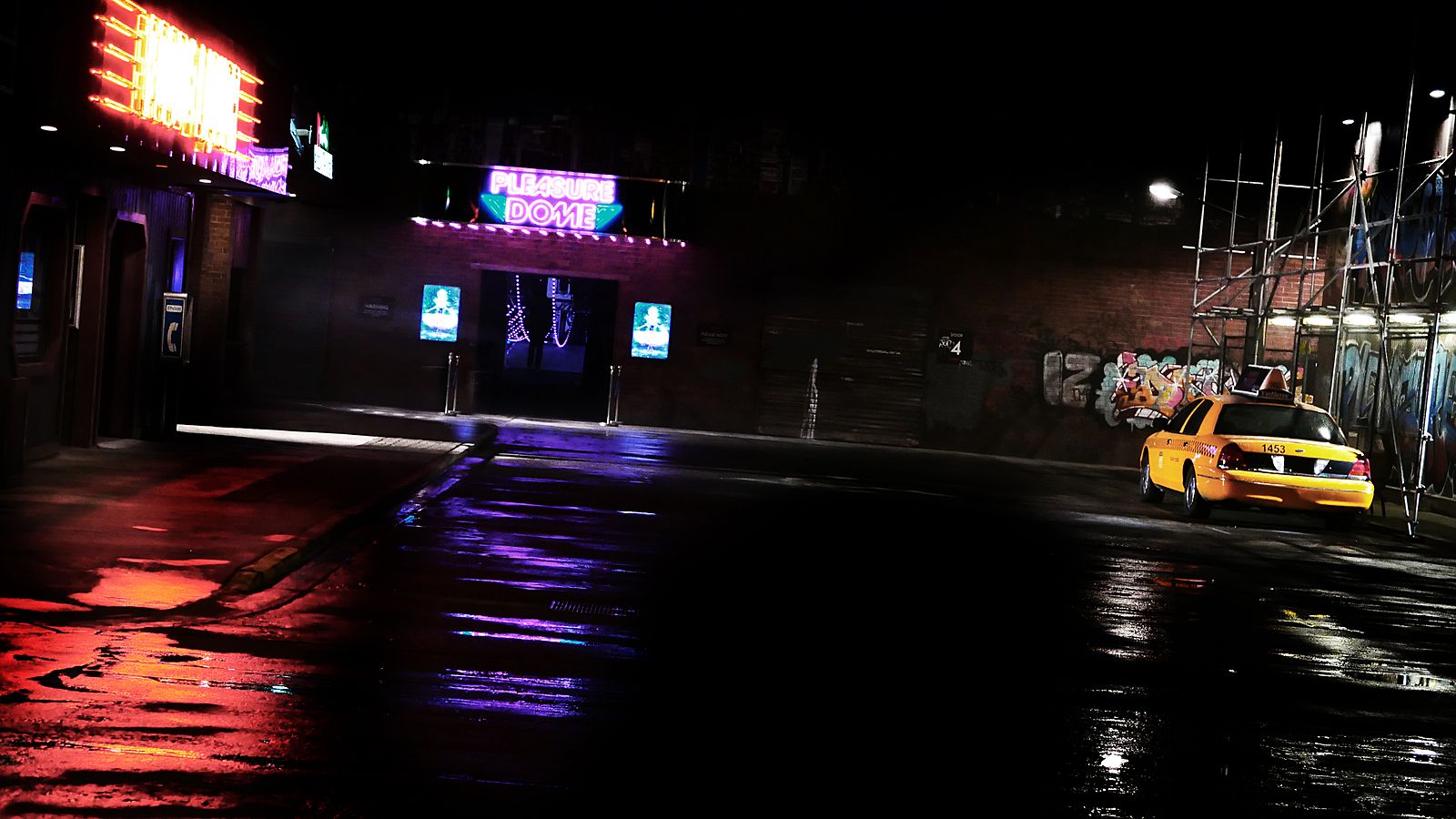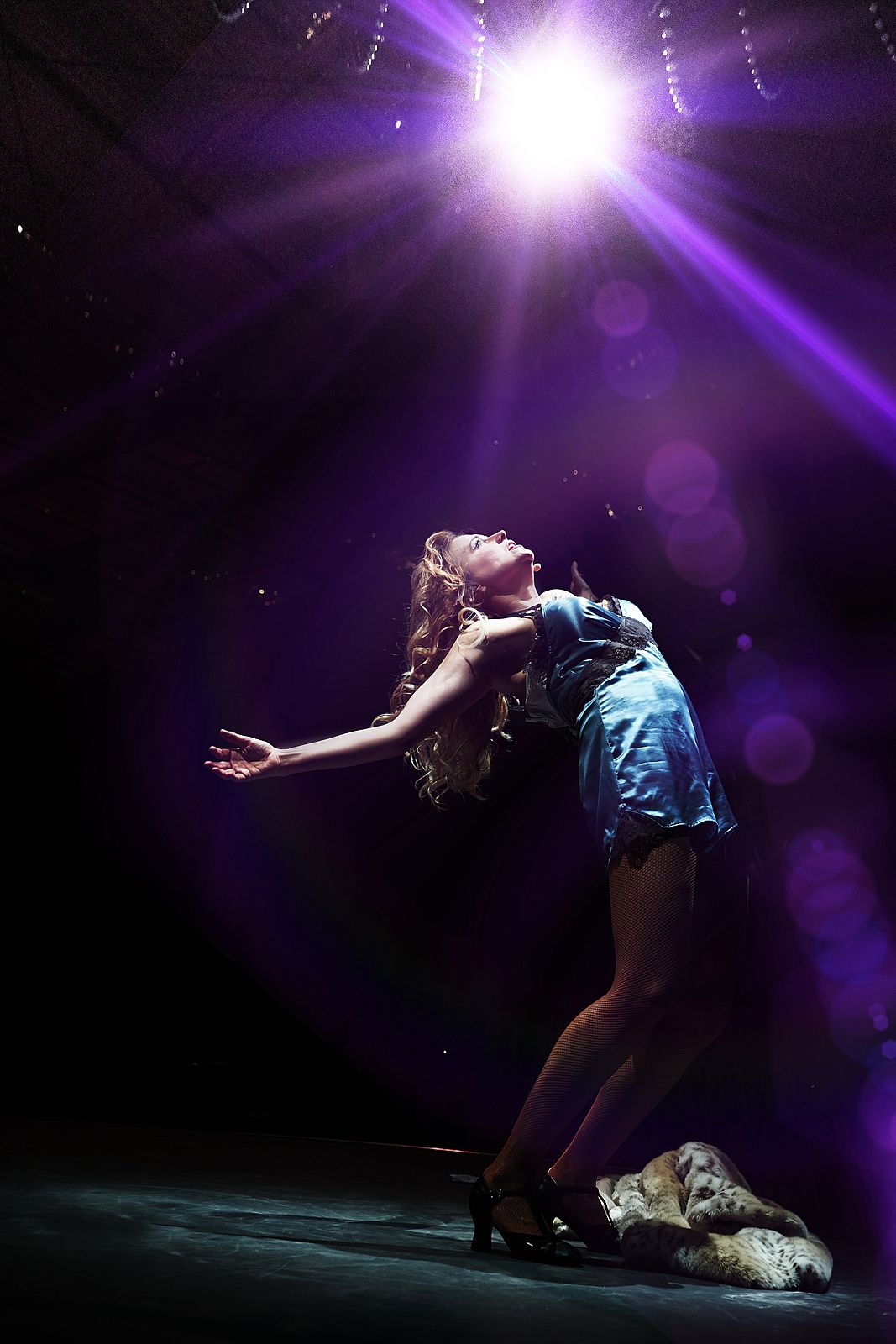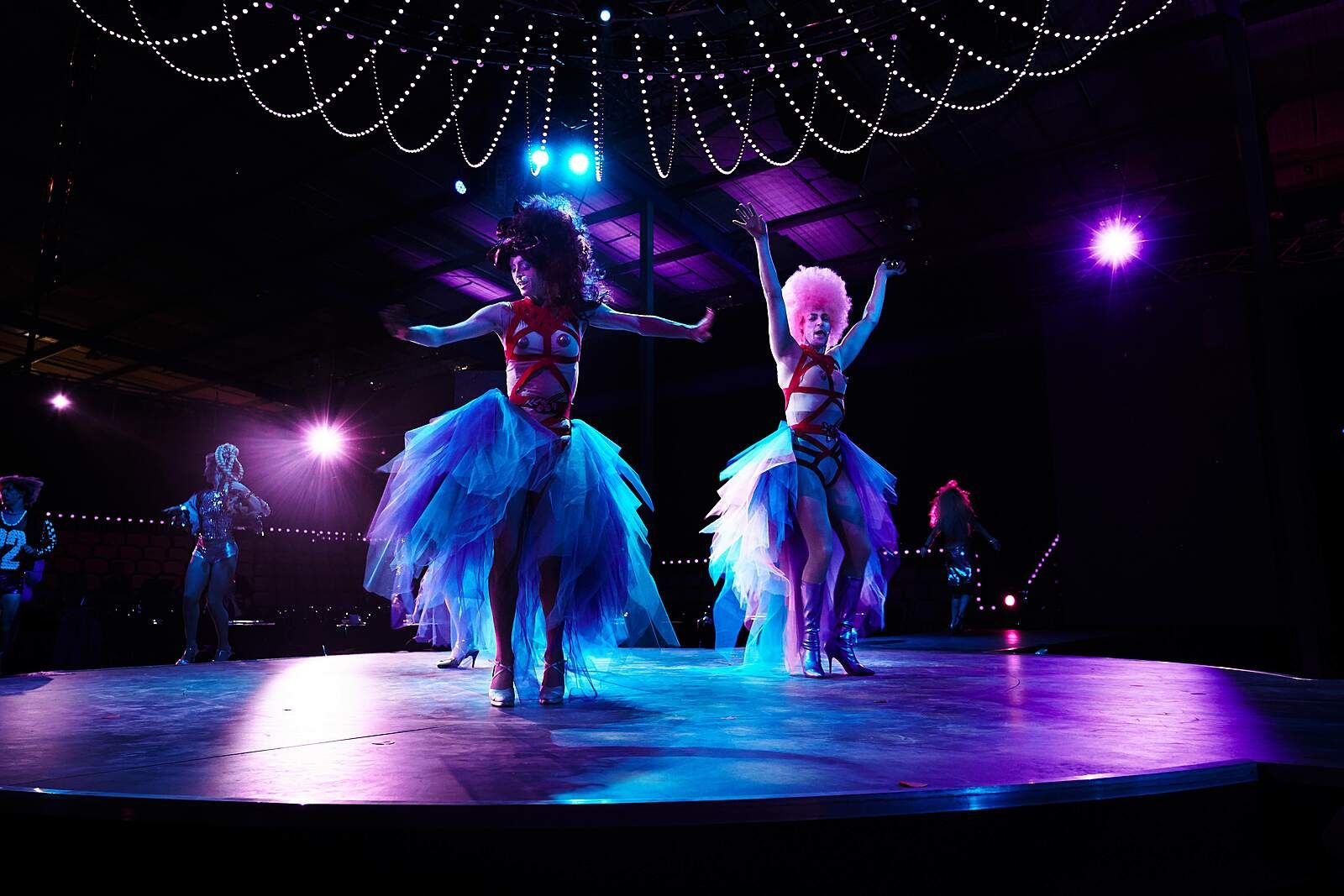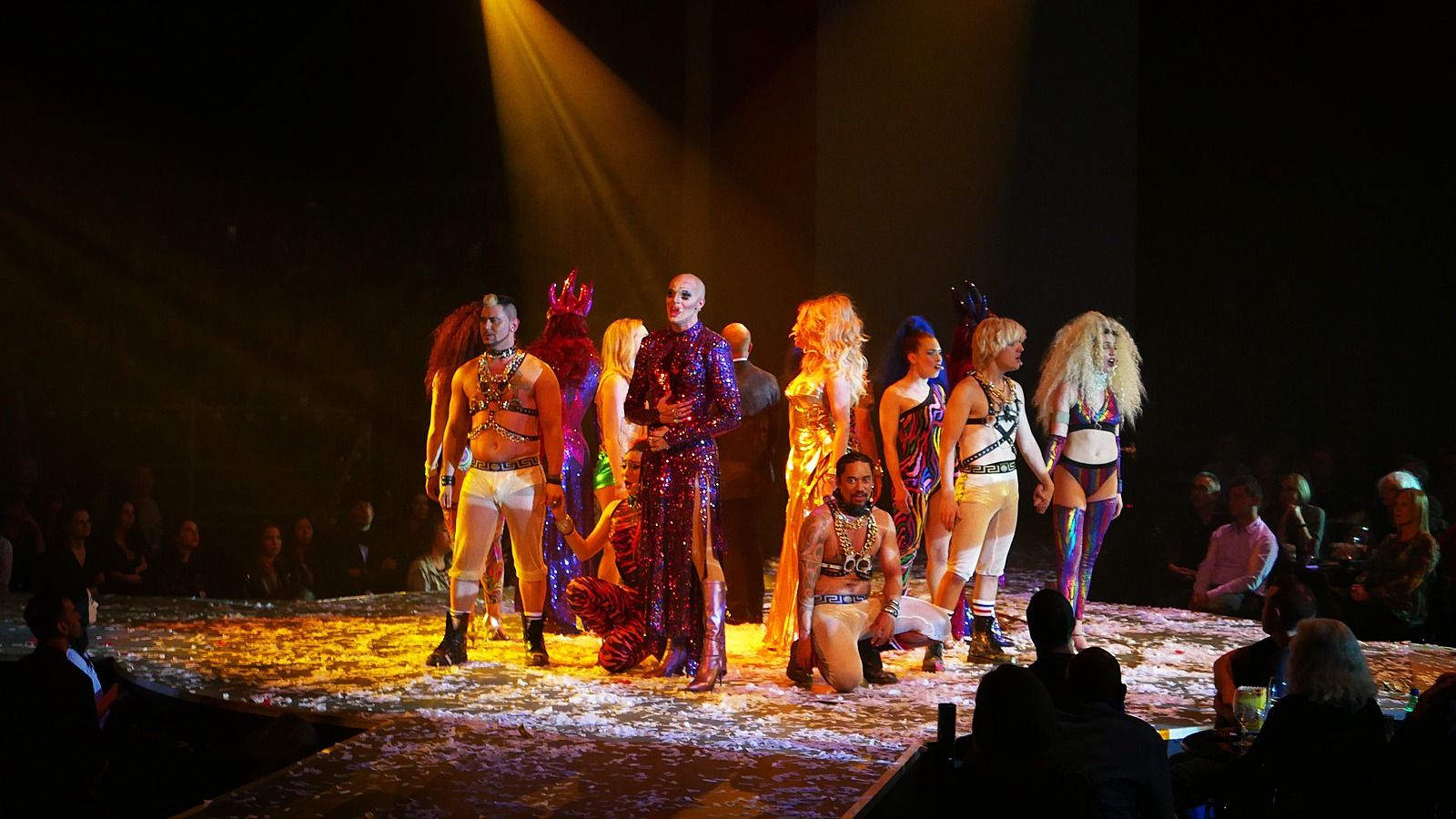Relax, Don't Do It: A Review of Pleasuredome
The big-budget 80s spectacle currently playing in a West Auckland warehouse leaves Kate Prior severely underwhelmed.
The big-budget 80s spectacle currently playing in a West Auckland warehouse leaves Kate Prior severely underwhelmed. This review contains spoilers.
There’s solid box office in nostalgia. We’re doing it all over the place and it covers a roll call of our most recent hit New Zealand shows: Hudson and Halls, Daffodils, The Modern Maori Quartet.
And now, in an Avondale warehouse with a 90s office façade, Pleasuredome is going arena-spectacular level with the nostalgia. The brainchild of screen producer Rob Tapert, screenwriter Mark Beesley and directed by Michael Hurst, it's a jukebox musical constructed around a series of 80s hits and the story of a dying New York club. Sappho, an ageing, drug-addled diva, played by Lucy Lawless, is at its centre.
Working to fill 800-seat houses each night, the producers are mounting this first Auckland season as a ‘calling card’ outing, targeting international buy-in. Following the success of the Pop-up Globe, the potential of more New Zealand-made commercial theatre with big pulling power that will likely head offshore is an exciting prospect. This is mass-market territory; when was the last time you saw paid content for a New Zealand-made show? We're not at the Basement anymore, Toto.
For this run only, the creators have gone ‘immersive’ in part, dressing a TV set that was conveniently lying dormant as a New York street, complete with bars and hotdog stands. This serves as the entrance to the show proper (which, to be clear, is not immersive – those fourth walls are firmly in place). This pretend 80s New York is pretty cool, but it’s risky. By choosing to use it, our expectations are set high; the show that follows needs to top that offer.
The show that follows doesn’t. From the detailed New York street we walk into a kind of bloated, expensively cheap-looking karaoke bar. As we make our way through the wonky-donky second half of Pleasuredome, it's clear that it is Not Good. To quote a friend, it’s historically, expensively, impressively bad. Sure, theatre wankers like me are not its primary audience (the PR has been very careful to keep that cursed ‘theatre’ word out of it) and I get that; it’s just a party and a great time! But no matter which way you cut it – whether as a musical, spectacle, arena gig or party (or a ‘minimum viable product’, as producer Charlie Mcdermott calls the New Zealand season) – the show, to speak Blinglish, doesn’t deliver.
But no matter which way you cut it – whether as a musical, spectacle, arena gig or party – the show, to speak Blinglish, doesn’t deliver.
There’s a thread of a story amongst the 80s tracks. Yet ‘thread’ suggests something in which each part affects and builds on the other. Here, not so much – it’s more constructed from a series of unrelated stepping stones, placed over a river of noise, in which the dialogue all seems curiously similar. Basically someone says "Get off her/Don’t do it/Leave me alone", their scene partner says "No", and it becomes a looping, soap-like, Meisner grind until someone turns around and sings. Like ambling over wobbly rocks in a river without a tree branch of narrative causality to steady you, it’s an unsure experience. But one thing's clear: the show is as much about gay rights as Waterworld is about climate change.
The overarching story trope is Save the Club/School/Orphanage, seen in innumerable films and that other jukebox musical Rock of Ages. Greedy developer Victor is going to bowl down the Pleasuredome, the club which has been home for years to diva Sappho, club owner Seth, some real-life people who died of AIDS, and yeah, just them mainly. But also a bunch of dancers with really high cut undies, a lot of butt cheek and big hair who under no circumstances talk or have characters. Most of them get into a bit of girl-on-girl action which is pretty sweet for us, too, but the club is closing and there’s not gonna be any more of that.
Just like in Rock of Ages, that greedy developer – who says ‘faggot’ a lot to flag that he is definitely homophobic – has offspring who defy him to save the club. His daughter Lilith has had a makeover, gotten high and fallen in love with Sappho via a series of same-same songs and a soft porn film sequence. So when Sappho is doing her big number on a chariot that your Dad made from old bicycle wheels and some lights left over from your school disco, Victor shoots her. But then she comes back to life. So it’s cool.
Good jukebox musicals are deceptively simple. What could be easier than constructing a storyline, then finding the requisite hits to fill out the emotional drive of each moment, right? In reality, they’re just as complex as if you were starting from scratch. Firstly, each song needs to be instantly recognisable – a number one, basically. Pleasuredome consists of about 40% number ones and 60% of “...do you know this one?”
Songs are just pumped out like a fat slab of headache-inducing ice cream in the middle of a wafer-thin scene. It’s a musical Tip Top Vanilla Slice.
Secondly, each song must not only fulfil that first elated moment of, “This song! It works so well for this moment! OMG!” but must help move a dramatic moment forward, or weave in and out of the storytelling. The lyrics and the shape of that number one song that already exists in the world need to be broken down and treated just as you would treat the script in the world of your story. That’s hard work. For such a challenge, you need a musical theatre writer. You’d reckon that for a show with a big budget and big ambitions, Pleasuredome would certainly have one. It doesn’t. At one point in the second half, Sappho and Lilith sing three songs in a row to each other, and for a good 15 minutes we’re frozen in one dramatic moment. Songs are just pumped out like a fat slab of headache-inducing ice cream in the middle of a wafer-thin scene. It’s a musical Tip Top Vanilla Slice.
But who cares about narrative value in Vegas? It’s pretty clear that when it comes to what has been championed in the process, a coherent story is further down the list of priorities. What about virtuoso performances? Maybe not; vocal performances vary wildly and there is some extremely wooden acting going on. But RELAX, it's just a heady nostalgia trip of 80s bangers. And perhaps that approach is fine, if you don't care too much about the intelligence of your audience. If you play that music loud enough and flash some super cool druggy graphics on the screen, we just might be reeled in. But it sure is fascinating to watch an audience who have absolutely no story buy-in looking around with glazed eyes, only to jump when you rustle the food box of an 80s riff.
So it’s an imperfect musical, but how does it deliver as an arena spectacular? At this stage in its life, it’s unconvincing. It’s clear a lot of cash has gone on expensive tech, and of course a film producer brings some clean AV. But that film influence has negative effects too: this is a live show and the stage and costume design is left severely wanting. There are so many unanswered questions. Why, in the era of Gaga, at the height of Ru Paul’s Drag Race, in that massive space, and on that massive budget, do we have drag queens whose hair is not an art piece, and whose costumes are not moving sculptures? Just like when you'd spend hours glittering your title page but leave your homework to the last minute, it's as if a bit too much design detail went into the show's New York entrance and not the show.
Despite the towering screens, a celluloid smallness weaves through design elements on stage, much of which are too small or plain for the vast space. On a minimalist set, every single object has an indelible impact. So why are a group of performers waking up on the floor under a purple blanket that looks a bit like the spare mink blankie you keep in the hot water cupboard? Why can I hardly see anything half the time? And seriously, what is with Dad’s chariot? There are some flame pyrotechnics that get released intermittently, but in the design vacuum they have all of the impact of a couple of party poppers. Brilliant spectacle is not something New Zealanders are novices at (refer to impressive Mum-fave, World of Wearable Art, currently running in Wellington) so it’s strange to see such an anaemic approach to design here. It feels like Mcdermott's so-called ‘minimum viable product’ is exactly that – a rough, rushed-together version for the locals.
Even if it’s just a bit of nostalgic fun, the biggest missed opportunity of all is comedy. There's not one scripted comic moment in the show.
Even if we don’t have story, live performance needs dynamics. An Adele arena gig might not have a narrative, but it definitely has light and shade. In Pleasuredome, with those imbalances of song and story, there's very little of that. As above, moments are dwelled on for far too long or we’re contending with such an onslaught of light and sound that we don’t know what we’re meant to be looking at, or listening to. And it’s probably not worth mentioning sound quality. It’s super bad – pounding bass and unintelligible vocals – but what can you do in a vast warehouse where acoustics go to die.
And even if Pleasuredome is none of these things; gig or spectacle or musical, even it’s just a bit of nostalgic fun, the biggest missed opportunity of all is comedy. There's not one scripted comic moment inthe show. Not one. The audience are gagging for it, to the point that if they hear anything vaguely resembling snap-back sass they’re all over it. But it’s dry kibble in a joyless desert. It’s like that peanut butter at the bottom of the jar that’s got no oil and just won’t spread. And none of the performers are really having fun. Robotic as they are, sometimes it feels like the dancers, who are working their bare arses off, are the only things holding up the energy of the show. I don't know about you but if I’m at a party and I’m not laughing, it’s time to go home.
One more thing – there’s a pretty grim feminist reading of the show. Oh yes, you know it. It would take in the empty vision of girl-on-girl titillation and trash soft porn, the ridiculousness of an entirely male writing team making ‘shock’ lesbianism a major plot point, and the distinct feeling that we’re inside the brain of a 14-year-old boy who is both turned on and repulsed by women’s bodies in equal measure, but it's just not worth it, Judith.
Shows for the masses can still be narratively satisfying. Formula can still be fulfilling. Indeed, in a recent Paperboy interview, producer Charlie Mcdermott proclaims that ‘content is king’. In this instance, the king is your drunk leery uncle, asking someone to sit on his knee, going outside to let off a few shit fireworks, mumbling something incoherent about love, before keeling over in a bush.
Pleasuredome The Musical runs from September 28. Tickets available here.





